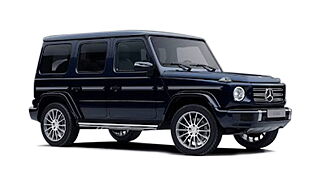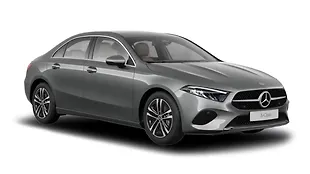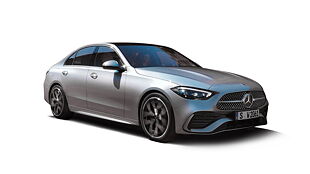What is it?

The new Mercedes C250d is a more powerful and better-equipped version of the C-Class, which hitherto, was only available in the 220d guise for diesel aficionados. According to Mercedes, the C250d was always part of the India plan, and is the German carmaker’s way of offering a wider choice to C-Class buyers. The C-Class – barring the new C250d – is currently offered with a petrol in C200 Avantgarde trim, and in Style and Avantgarde versions for the diesel powered C220d. The Style is the cheaper and lesser-equipped one. Now back to the C250d…

How is it on the inside?

We have said this repeatedly and it holds true even today – the C-Class is the current benchmark in its class when it comes to interiors. The design, the look and feel, the quality, and especially the way the things operate inside the C-Class’ cabin are all top class. There’s a positive click to every operation then be it movement of the aircon vents, the functioning of the power windows or for the various buttons on the car’s central console, and of course, the COMAND system. It just feels like a solidly engineered car.
It feels airy too thanks to a reasonably large glass area and the light coloured interior trim. But, space isn’t the C-Class’ strong suit, particularly at the rear. It doesn’t have the best rear seats in the business either; the seat squabs are short on support and the seat back is a little too reclined.

As for equipment, the C250d offers more than the Avantgarde trim on the C220d, but only just. On the outside, all you get is the all–LED intelligent lighting system that tells the C250d apart from its lesser powerful twin. The system dips the light beam automatically and comes with cornering function for better visibility around bends. And inside, there’s ambient lighting (in three moods), besides gloss wood finish on the central console and doors. The C250d also gets a self-park feature. The car will pick the spot for you and then guide you into that spot while it twirls the steering by itself. All you need to do is shift from D to R and then back to D and control the brakes.
Otherwise, it’s C220d Avantgarde all the way, and that’s not a bad thing for the C220d is already well equipped. There’s a sunroof, blinds for rear windows and windscreen, lots of cup and bottle holders, electric powered front seats with memory, cruise control, and so much safety kit, it’s impossible to list in one breath.

How does it drive?

The biggest change here, as the badging on the bootlid of the car suggests, in under the hood. The engine is the same as on the C220d in terms of capacity and construction but courtesy twin turbos, it makes 204bhp, over 30bhp more than the 220d. The peak torque has climbed too, by 100Nm to 500Nm. And that’s not all. The C250d also gets a new gearbox. Compared to the 7-speed 7G-tronic auto on the C220d, the 250d gets a 9-speed automatic (aptly called 9G-Tronic), which not shifts quicker, but it also reacts better to the steering mounted paddle shifter than the 7-speeder.
And on the road, this translates into significantly quicker acceleration, effortless overtaking and surprisingly good fuel economy. In terms of times, the C250d gets to 100kmph from a standstill in 7.34 seconds while 150kmph comes up in 16.50seconds. The 20-80kmph and 40-100kmph kickdowns only take 4.87s and 5.87s, respectively. Just goes to show the quick reaction times of the 9-speed ‘box. The car tops out at 247kmph. As you can tell, the C250d might have both higher power and torque ratings compared to the BMW 320d, its chief competitor, but it is slower than the BMW on all counts. The difference isn’t much, but it is there.

Now, the 2143cc, four-cylinder, diesel from Mercedes isn’t one of the more refined engines in its class either, rev it and it sounds granular and loud. But, thanks to the 9-speed ‘box; if you leave the gearbox in D and select Comfort mode, one can hardly hear the engine inside the cabin. Yes, like on the C220d, the C250d too gets four drive modes – Eco, Comfort, Sport and Sport+. And for those who like higher levels of customization, there’s also the Individual mode.
In Individual, the driver can pick and choose the performance of the three alterable elements – engine and gearbox, steering and climate control – and set them individually to work on either of the four drive mode settings. So, for instance, the ideal setup for us was to leave the steering and climate control in Comfort, and the engine and gearbox in Sport+. The working of these modes is identical to the C220d. In Comfort then, the steering is light and the throttle response relaxed. It’s not slow but it isn’t as alive as in Sport or Sport+. And the steering in the latter modes weighs up to give the driver a feel of driving something sportier.

But, the C250d isn’t exactly a sporty car. It doesn’t enjoy being hustled around. Throw it hard into corners and it chooses the safer understeer option. And there’s some body roll too. Plus, the steering isn’t bubbling with feel. The C250d prefers fast, long corners to the tighter variety. Thankfully, it doesn’t have a strict preference when it comes to ride. At slow speed or high; over flat surfaces or undulating ones; when fully laden or not; the C-Class’ ride remains supple, absorbent and silent. Its suspension doesn’t have a lot of travel of course, given it’s a luxury sedan. So, if the bumps get high and the potholes get deeper, it does thump through them harshly. But, it’s the exception than the norm.
Should I buy one?

The Mercedes C250d has more bells and whistles (though just a few), it has a more powerful engine, and it has better on-road performance. For all this, Mercedes is charging around Rs 4 lakh more than the top-spec C220d Avantgarde. To us, spending this extra money is a no-brainer. And it doesn’t matter if you are chauffeur driven or not; whether you go out on highways often or not; or whether you are under 50 or not, the C250d is just better value.
Where does it fit in?

Traditionally, if it’s a Mercedes, it must have an Audi and BMW equivalent. And the C-Class has them too – the BMW 3 Series and the Audi A4. The latter is due for a replacement in a few months time, so unless you simply must have an Audi, the BMW makes more sense. But, there’s also a Volvo you might want to consider – the Volvo S60 D5. It’s not as big or rich looking, particularly on the inside, but it too has a potent engine and credible dynamics. The BMW 320d in M Sport guise at Rs 55.3 lakh is the costliest, while the Volvo S60 Inscription is the most affordable here with a price tag of Rs 53.3 lakh. The Mercedes C250d meanwhile treads the middle path and costs Rs 54.4 lakh. All prices are on the road in Mumbai.
Photography by Ameya Dandekar
Click here to read our review of the Mercedes-Benz C220 CDI
Click here to read our road test of the Mercedes-Benz C63 S AMG

![Mercedes-Benz C-Class [2014-2018] Exterior Mercedes-Benz C-Class [2014-2018] Exterior](https://imgd.aeplcdn.com/642x361/cw/ec/23022/MercedesBenz-CClass-Exterior-70989.jpg?v=201711021421&wm=1&q=80)
![Mercedes-Benz C-Class [2014-2018] Right Front Three Quarter Mercedes-Benz C-Class [2014-2018] Right Front Three Quarter](https://imgd.aeplcdn.com/642x361/cw/ec/23022/MercedesBenz-CClass-Right-Front-Three-Quarter-70992.jpg?v=201711021421&wm=1&q=80)
![Mercedes-Benz C-Class [2014-2018] Right Rear Three Quarter Mercedes-Benz C-Class [2014-2018] Right Rear Three Quarter](https://imgd.aeplcdn.com/642x361/cw/ec/23022/MercedesBenz-CClass-Right-Rear-Three-Quarter-70990.jpg?v=201711021421&wm=1&q=80)
![Mercedes-Benz C-Class [2014-2018] Rear View Mercedes-Benz C-Class [2014-2018] Rear View](https://imgd.aeplcdn.com/642x361/cw/ec/23022/MercedesBenz-CClass-Rear-view-70996.jpg?v=201711021421&wm=1&q=80)
![Mercedes-Benz C-Class [2014-2018] Rear View Mercedes-Benz C-Class [2014-2018] Rear View](https://imgd.aeplcdn.com/642x361/cw/ec/23022/MercedesBenz-CClass-Exterior-70997.jpg?v=201711021421&wm=1&q=80)
![Mercedes-Benz C-Class [2014-2018] Left Side View Mercedes-Benz C-Class [2014-2018] Left Side View](https://imgd.aeplcdn.com/642x361/cw/ec/23022/MercedesBenz-CClass-Left-Side-View-70995.jpg?v=201711021421&wm=1&q=80)
![Mercedes-Benz C-Class [2014-2018] Left Front Three Quarter Mercedes-Benz C-Class [2014-2018] Left Front Three Quarter](https://imgd.aeplcdn.com/642x361/cw/ec/23022/MercedesBenz-CClass-Left-Front-Three-Quarter-70994.jpg?v=201711021421&wm=1&q=80)
![Mercedes-Benz C-Class [2014-2018] Front View Mercedes-Benz C-Class [2014-2018] Front View](https://imgd.aeplcdn.com/642x361/cw/ec/23022/MercedesBenz-CClass-Front-view-70993.jpg?v=201711021421&wm=1&q=80)
![Mercedes-Benz C-Class [2014-2018] Image Mercedes-Benz C-Class [2014-2018] Image](https://imgd.aeplcdn.com/272x153/cw/ec/18473/MercedesBenz-CClass-Exterior-130762.jpg?wm=0&q=80)























